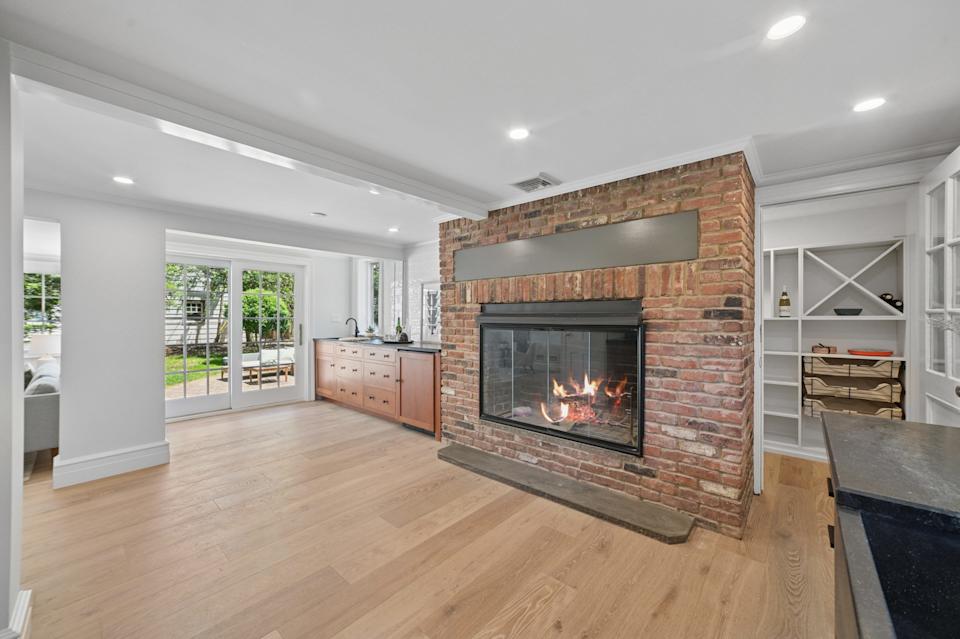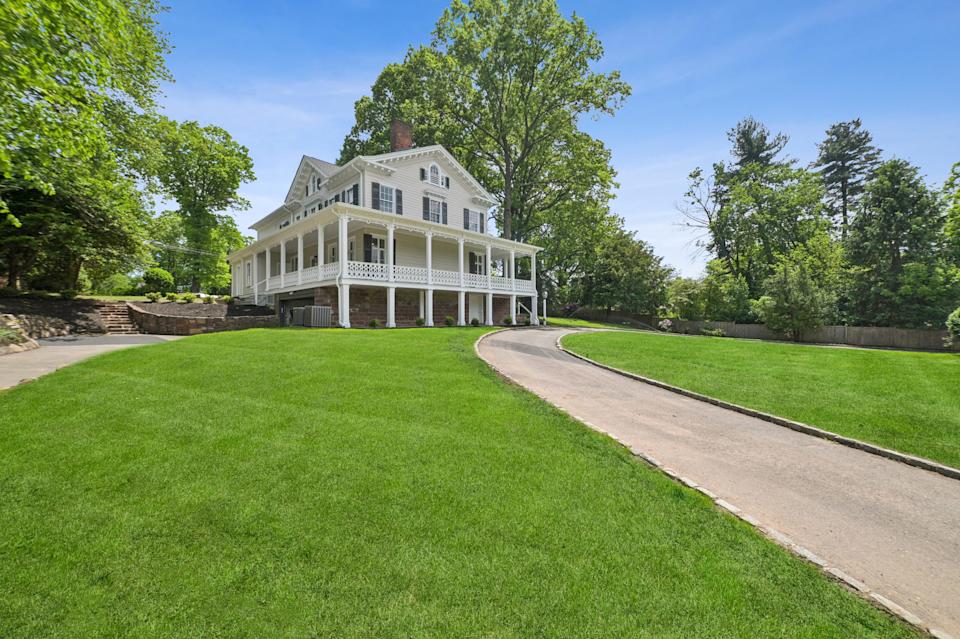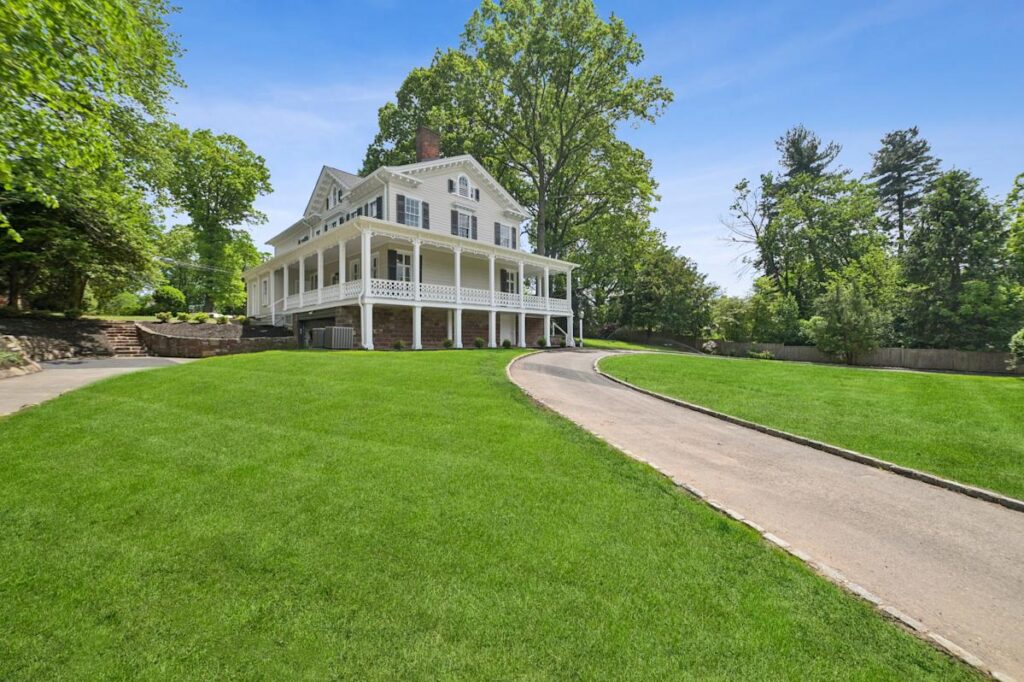A 19th-century farmhouse once tied to Montclair’s early apple trade is on the market near Edgemont Park.
Built by the Harrison family on farmland that later gave rise to the Erwin Park neighborhood, 249 Valley Road is one of the area’s few remaining links to its agricultural past. Recently renovated, it was listed in May for $1,939,000 by Melissa Bigelow of Prominent Properties Sotheby’s International Realty, a longtime resident who said the property has been getting a lot of attention.
The five-bedroom, five-bathroom home has a first-floor layout that combines formal spaces with a large kitchen and adjacent family room. There is a library or office on the main floor, while all five bedrooms are upstairs. Upstairs includes a laundry room and four full baths, including a redone primary bath, a Jack and Jill, an en suite and a hall bath. The primary bedroom also has two new walk-in closets.
The 19th-century farmhouse at 249 Valley Road in Montclair was once the focal point of the Harrison family farm, well known for apple cider and vinegar before the 20th-century development of Erwin Park.
The home, which sits less than a half-mile from the train station, was reportedly built in about 1840 by Jared Erwin Harrison, the Erwin Park namesake who helped bring the Newark and Bloomfield Railroad to the area, Philip Doremus wrote in his 1908 book “Reminiscences of Montclair.”
Hailing from a family of early American settlers who were based in New Haven, Connecticut, he was the son of Moses Harrison, who was living in Orange prior to arriving to Montclair in 1802, according to records compiled by the Sons of the American Revolution’s New Jersey Society. Born in 1758, he was a private in the New Jersey Militia during the American Revolution, society records show.
The house at 249 Valley Road was once the focal point of Harrison Farm, a spread that ran from Park Street past Valley Road and climbed toward the top of First Mountain, Henry Whittemore wrote in his 1894 “History of Montclair Township.” The farm was known for its apple cider and vinegar, a business Doremus described as having “an extensive reputation.” Part of the Harrisons’ land later became Edgemont Park.
Today, the farmhouse faces that same green space, with a broad front porch overlooking the park. Its layout, Bigelow said, is unlike most Montclair homes and is made even better by the wrap-around porch.
“It is really expansive, and it’s got the most beautiful views of Edgemont Park,” she said.

The 19th-century farmhouse at 249 Valley Road in Montclair was once the focal point of the Harrison family farm, well known for apple cider and vinegar before the 20th-century development of Erwin Park.
Recent work on the home includes a new roof, new flooring in the kitchen and family room and refinished floors throughout, according to Bigelow. The interior and exterior have been painted, and a new wood fence lines the back of the property. Ceiling height and tall windows on the first floor add to the light-filled layout.
The home is flanked by a neighborhood of the Harrison family’s creation, Erwin Park. The community includes about 50 properties that were built up in the late 19th and early 20th century by Jared Erwin Harrison’s youngest son, Nathan Harrison, along and near Erwin Park Road.
Marketed in publications such as Country Life, Erwin Park was designed as a commuter-friendly enclave for affluent city workers. Carved from the Harrison family’s land between Midland Avenue and Valley Road, the neighborhood was laid out in 1897 and included a golf course in its early years. Most of the homes, including 249 Valley Road, are within a 10-minute walk of the Watchung Avenue Station.

The 19th-century farmhouse at 249 Valley Road in Montclair was once the focal point of the Harrison family farm, well known for apple cider and vinegar before the 20th-century development of Erwin Park.
Among Erwin Park’s early residents were Funk & Wagnalls co-founder Isaac Funk and his son Wilfred Funk. Isaac Funk, a Lutheran minister turned publisher, lived at 11 Erwin Park. Wilfred Funk, who headed Funk & Wagnalls for 15 years before launching his own company, lived at 16 Erwin Park.
Wilfred Funk, who also edited Literary Digest, sat on Montclair’s library board for nearly two decades and was the first president of the Montclair Community Chest. He moved to the town in 1908 and lived there until his death in 1965, according to various reports in The Montclair Times. His former home at 16 Erwin Park was put on the market in 2025 at a listing price of $3.35 million.
This article originally appeared on NorthJersey.com: Montclair NJ 19th century apple farmhouse listed for $1.939M
Read the full article here


